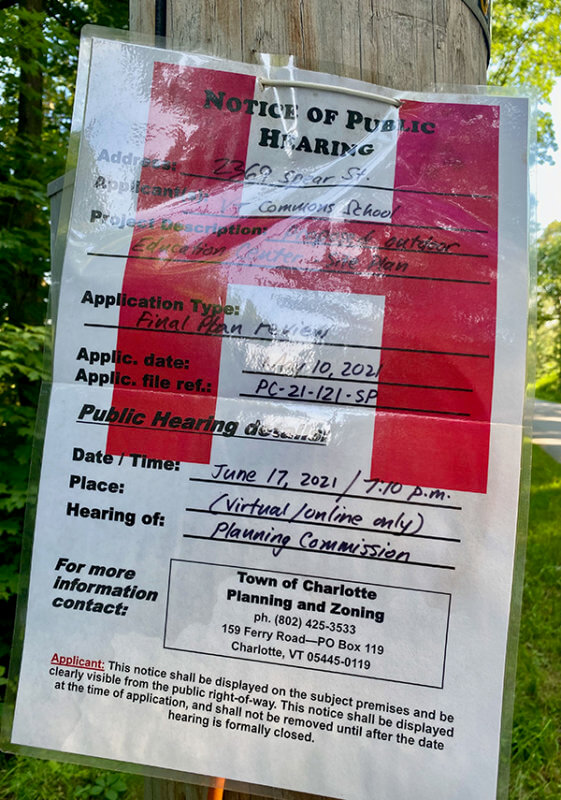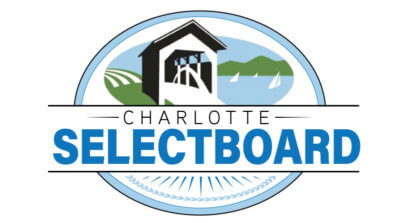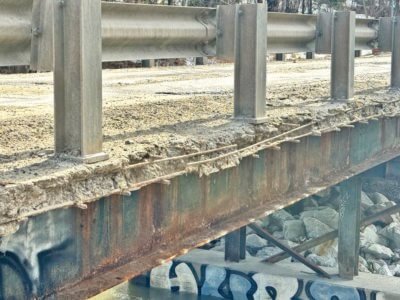Selectboard stalls on Vermont Commons highway access permit
In a 4-0 (1) vote, with Chair Matt Krasnow abstaining, the Selectboard delayed approving a highway access permit for Vermont Commons School until October 11 or such time as the zoning board completes its conditional use review. The applicant’s site plan was granted conditional approval by the Planning Commission on July 29.

Attending the August 9 regular Selectboard meeting were neighbor Sarah Thompson and her attorney Joseph Obuchowski, Road Commissioner Hugh Lewis, Jr. (“Jr.”), Civil Engineering Associates Principal Engineer David Marshall, site neighbors Janet and Gary Landrigan, and Vermont Commons Schools Board of Trustees Secretary Craig Heindel.
Selectboard members’ reluctance to move forward on the permit was based on a June 11 site visit where some members observed potential safety issues, as well as additional concerns raised by adjoining property owners.
Selectboard member Louise McCarren said she was “gravely concerned” about a utility pole at the access point that blocks drivers’ line of vision when looking south.
“There’s going to be a lot of traffic by a lot of inexperienced drivers, so I cannot support [approving] this [permit],” McCarren said, presumably referring to student drivers.
Krasnow countered that the applicants had already agreed to remove two trees to improve the line of sight, but McCarren said the pole should be relocated or the curb cut moved.
Marshall explained that drivers exiting onto Spear Street would be looking “behind the utility pole”, and the only obstruction to their line of sight were two trees the applicants intended to remove.
Jr. confirmed that drivers “can see behind” the pole and said his only recommendation to Marshall was removing the trees.
Thompson, whose family has used the proposed access point as a driveway since purchasing the property in the 1970s, said she was concerned that permits approved by the Selectboard and planning commission could be rendered moot by decisions yet to be made by the zoning board.
Selectboard Vice-Chair Frank Tenney agreed, stating the ZBA still has to determine “where buildings go and where the uses are. How can you approve a site plan when the use has not been approved [by the zoning board]?”
Thompson referred to language in Charlotte Land Use Regulations stating that in cases where both planning commission and zoning board approval is required, zoning board decisions should precede those made by the PC. The board reviewed Land Use Regulations Section 5.1 “Conditions of Review” during the meeting.
Neighbor Gary Landrigan said he and his wife, Janet, “share Louise [McCarren]’s concern” about the utility pole and “the volume of traffic” resulting from school events.
“My understanding is that anywhere from 30 to over a hundred vehicles will come and go through that access,” Landrigan said. “So, I really share Louise’s concern for the safety of the access, and I really feel that there’s a safer alternative.”
Landrigan said consideration should also be given to Thompson who, if the permit is approved, will be forced to share the the only driveway that accesses her property with student and other school-related vehicles.
“If I were in Sarah’s position, I would be really disturbed by the whole lack of consideration for her continued quiet enjoyment of her property, which certainly includes the driveway,” Landrigan said.
Krasnow pointed out that the curb cut Thompson uses to access her property is on land owned by Vermont Commons School.
“This is an unusual case where one property owner is using a highway access curb cut on someone else’s property,” Krasnow said. “There is nothing that precludes Sarah from having a curb cut on her property.”
Krasnow said attempting to limit the existing curb cut on someone else’s property was a consideration the Selectboard “hasn’t seen before.”
Obuchowski described Krasnow’s remarks as “prejudicial and misleading.”
“There’s a conclusion here about someone else’s property and not having rights,” Obuchowski said. “These are questions that can be determined in court, if necessary.”
Obuchowski said that after promising Thompson they would “work something out” with her regarding the access to her property, the applicants had not been in touch with her since April.
“Can you defer [approval] until the zoning board has approved the use?” Thompson asked the Selectboard. “Because right now everything feels sort of out of order and premature.”
Thompson reminded the board that the planning commission required applicants to give her the right of way “before anything moves forward”, but said she had yet to receive it.
Heindel said Vermont Commons “would not be opposed to” Thompson’s request to postpone the project’s highway access permit review.
“We… know that we need to go through the conditional use review process with the zoning board and there is a possibility that there will be significant discussion about the location of the curb cut,” Heindel said. “Although the application in front of you has been approved by the PC [and] we would prefer for you folks to move ahead, if you’re not feeling comfortable on that I can understand the complication.”
Heindel added that the reason the application was submitted to the planning commission prior to the zoning board was because at the time, Town Planner Larry Lewack “suggested there was turmoil… in the town planning processes and boards,” and “it would be better to have separate hearings.”
When reached for comment, Lewack confirmed the “turmoil” in question referred to last April when four of the five zoning board members, including then-ZBA Chair Tenney, resigned, leaving current ZBA Chair Lane Morrison as it’s sole member.
The Selectboard voted to postpone the highway access permit review until October 11 at 7:30 p.m. If the ZBA has not yet determined conditional use by that time, the Selectboard said they will reschedule the item to a later date.
Related Stories
Popular Stories
If you enjoy The Charlotte News, please consider making a donation. Your gift will help us produce more stories like this. The majority of our budget comes from charitable contributions. Your gift helps sustain The Charlotte News, keeping it a free service for everyone in town. Thank you.
Andrew Zehner, Board Chair





